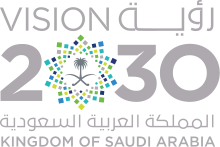The Kingdom's vision for industry

In light of the economic and social transformations taking place in the Kingdom of Saudi Arabia Saudi Vision 2030 has emerged as an ambitious strategic plan aimed at diversifying sources of national income and gradually getting rid of heavy dependence on oil. Under its wise leadership, the Kingdom seeks to achieve a major industrial renaissance that enhances its position as a country capable of competing in the global economy.
Through a comprehensive and integrated program, this vision focuses on developing the industrial sector through investment in technology and innovation, in addition to enhancing the role of the private sector in the economy.
In this article, we will analyze the central goals of Saudi Vision 2030 in the field of industry, implementation strategies, and potential challenges that may face these ambitious efforts. We review how the Kingdom seeks to transform the Saudi economy into a more diversified and sustainable model, achieving comprehensive and sustainable economic growth for future generations.
Analysis of Saudi Vision 2030 for industry
Features of Saudi Vision 2030 for industry include diversifying the economic sector, promoting innovation, and improving industrial infrastructure. The vision aims to achieve a major transformation in the industrial sector by attracting investments, enhancing productivity and developing human resources. The vision also aims to enhance innovation and technology capabilities in industry and enhance cooperation between the public and private sectors in supporting industrial development.
Objectives and strategies of Saudi Vision 2030 for industry
The Saudi Vision 2030 for industry aims to achieve several main goals. These goals include promoting the development of the industrial sector to become a major driver of the national economy.
The vision also aims to attract local and foreign investments and promote innovation in the industry.
In addition, the vision seeks to increase the rate of national participation in the industry and develop human resources capabilities in this sector.
The vision's strategies are based on diversifying the industrial sector, enhancing cooperation between the public and private sectors, and improving productivity and quality in the industry.
Implementing the Saudi Vision 2030 for industry
The Saudi government is currently working to implement the Saudi Vision 2030 for industry through several efforts. Measures have been taken to enhance the competitiveness of industrial companies and develop the local industrial sector. The necessary facilities were provided to small and medium-sized companies and investment in promising industries was encouraged. There is also a focus on stimulating the spirit of innovation and promoting modern technology in the industry. The government and private sectors are working to enhance cooperation, and provide the necessary support and resources to achieve the Saudi Vision 2030 for industry.
Challenges of implementing Saudi Vision 2030 for industry
Implementing the Saudi Vision 2030 for industry faces several challenges. Among the most prominent of these challenges, promoting innovation and the use of modern technology in industry is a priority.
Saudi industry also needs to develop the available skills base and provide training and qualification for local workers.
Increasing global competition is also a challenge to achieving the goals set in the Saudi Vision 2030 for industry.
It is important to address these challenges and work to provide the appropriate environment and regulatory legislation for industrial transformation in the Kingdom.
Main industrial sectors
Saudi Vision 2030 targets several key industries to develop the national economy. These industries include petrochemicals, energy, mining, food and agricultural industries, and military manufacturing. The vision aims to strengthen these industries and improve their productivity and the quality of products and services provided. These industries are considered areas that have great potential for growth, providing new job opportunities, and enhancing the Kingdom’s exports and global competitiveness.
The Saudi economy is witnessing remarkable development in the main industrial sectors. Saudi Vision 2030 has contributed to enhancing this development by improving the investment environment and encouraging local and foreign companies to invest in various industries. Industrial sectors such as petrochemicals, energy, mining, health, technology, tourism and others have been developed. The productivity of these sectors increased and the quality of products and services provided improved.
The development of the main industrial sectors in the Kingdom
The Saudi economy is witnessing remarkable development in the main industrial sectors. Saudi Vision 2030 has contributed to enhancing this development by improving the investment environment and encouraging local and foreign companies to invest in various industries. Industrial sectors such as petrochemicals, energy, mining, health, technology, tourism and others have been developed. The productivity of these sectors increased and the quality of products and services provided improved.
Challenges and opportunities
Implementing the Saudi Vision 2030 for industry faces several challenges. This includes advanced technology that requires significant investment and training of workers to use it. It also requires developing operational efficiency and improving industrial infrastructure. In addition, the Kingdom's industry faces the challenges of dependence on oil and economic diversification. However, Saudi Vision 2030 presents opportunities to develop new industrial sectors and promote innovation and investment in advanced technology.
Opportunities available to develop industry in the Kingdom
Saudi Vision 2030 provides many opportunities to develop industry in the Kingdom. Among these opportunities are enhancing competitiveness, increasing productivity, diversifying products, and expanding exports. It also represents an opportunity to develop labor skills and enhance technical training and education.
In addition, Saudi Vision 2030 provides opportunities for investment in renewable energy, information technology, and e-commerce. By exploiting these opportunities, the Kingdom can promote industrial development and create new job opportunities.
Conclusion
Saudi Vision 2030 for industry presents great opportunities to develop industry in the Kingdom and achieve sustainable development. By achieving its goals and strategies, the Kingdom can raise production rates and competitiveness in the global market. Although there are challenges in implementing Vision 2030, the efforts made so far suggest successes in developing the industry and providing new job opportunities. Subsequently,

